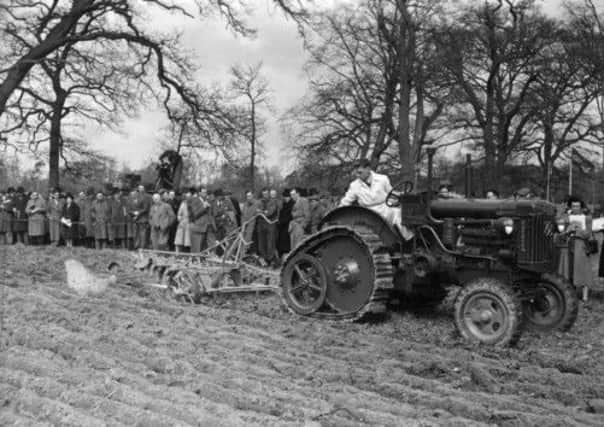Lure of the land gallops through families


I try not to pay extra attention to anniversaries that end in five or zero, but can’t avoid the fact that 8 November was the 40th of my father’s death. He was 57. I spent a worried year at that age – something I’ve discovered many men do. Living longer than your father did is now common enough, but experiencing it makes us ponder the meaning of life more than usual.
As does living longer than your grandfather, an anniversary I passed a couple of years ago with more pause for serious thought, mostly about whether, with a more stress-free and comfortable lifestyle than either generation enjoyed, I’ve had as worthwhile a life or can counteract genetics and continue to put more years on the clock.
Advertisement
Hide AdAdvertisement
Hide AdAnother 30 or so would be handy for all I have in mind. No doubt my father, with his “Live as if you might die today, farm as if you will live for ever” ethos – the line he wrote in an autograph book I kept briefly as a boy – thought the same. But stomach cancer and, just as crucially, a lifetime of non-stop hard physical work denied him that.
My grandfather believed similarly that hard work was the answer to most problems. It would have taken a lot to convince either man that wasn’t necessarily so, and that the hoary farming adage about “never making money by taking your jacket off” held some truth.
There are successful examples of both schools of thought. I’ve interviewed and written about farmers who started with nothing or very little – “I had eight hens and an old tractor”, as one said – and built up extensive, successful, businesses.
I’ve met others, or watched them in action, who built up even more successful businesses by being good managers of time and money, thinking big and borrowing bigger, paying others to graft while they did the thinking, and dealing permanently in a collar and tie.
Then there are others who combined both approaches, including the large-scale dairy farmer who said that as a younger man “who thought I’d built a bigger fire than I could carry sticks to” he calmed his worries with a few hours of flat-out physical work before getting back to the desk and the phone.
There are others still who simply have a talent for making money and would have succeeded in whatever line they chose, but it just happened to be farming. Whereas my father and grandfather might have quoted another bit of farming lore: “Money talks, but I only ever hear it say goodbye.”
My grandfather might have known better. One of a large farming family, he began to train as a lawyer and was more than intelligent enough to see the long-term possibilities. But he gave them up to go into partnership with a brother on a small tenanted farm. The lure of the land is a kind of hereditary insanity that gallops rather than runs through our family history.
That partnership was dissolved soon after the end of the First World War. He lost his first wife, married one of her sisters who was prepared to take on a family of eight, and in 1930 – the middle of the farming depression years – moved from East Lothian to a bigger farm in Northumberland.
Advertisement
Hide AdAdvertisement
Hide AdThere my father, already working at home from the age of 14, was appointed shepherd and learned the hard way about the joys of sheep. After my grandfather died, history repeated itself and my father came out of partnership with a brother to take a tenancy of his own in 1951 on a small Borders farm where the previous tenant had gone bankrupt.
Building it up with a large family, taking chances to increase the acreage, starting to make profits, took a long time. Remarkably, in spite of the gruelling hours and work load, he found time to be involved with young farmers, start a youth club, and be one of the driving forces behind a new village hall. About the time life looked as if it might get easier – in 1973, malting barley hit an unprecedented £50 a ton, children earning their own livings, new machinery on order – he fell ill and died.
But not, characteristically, before harvest was over, including late beans. The last job I did with him, on a day away from The Scotsman where I was deputy agricultural editor to Bob Urquhart, was putting beans into store after struggling to rig up an auger with a certain amount of knuckle-grazing, swearing and cheek about “soft hands”. A few days later, he was dead.
It doesn’t take 8 November to remind me of the most honest, hard-working man I’ve ever known, but the text on the headstone where I laid flowers at the weekend puts it well enough: “Here lies a workman who needeth not be ashamed of his labours.”